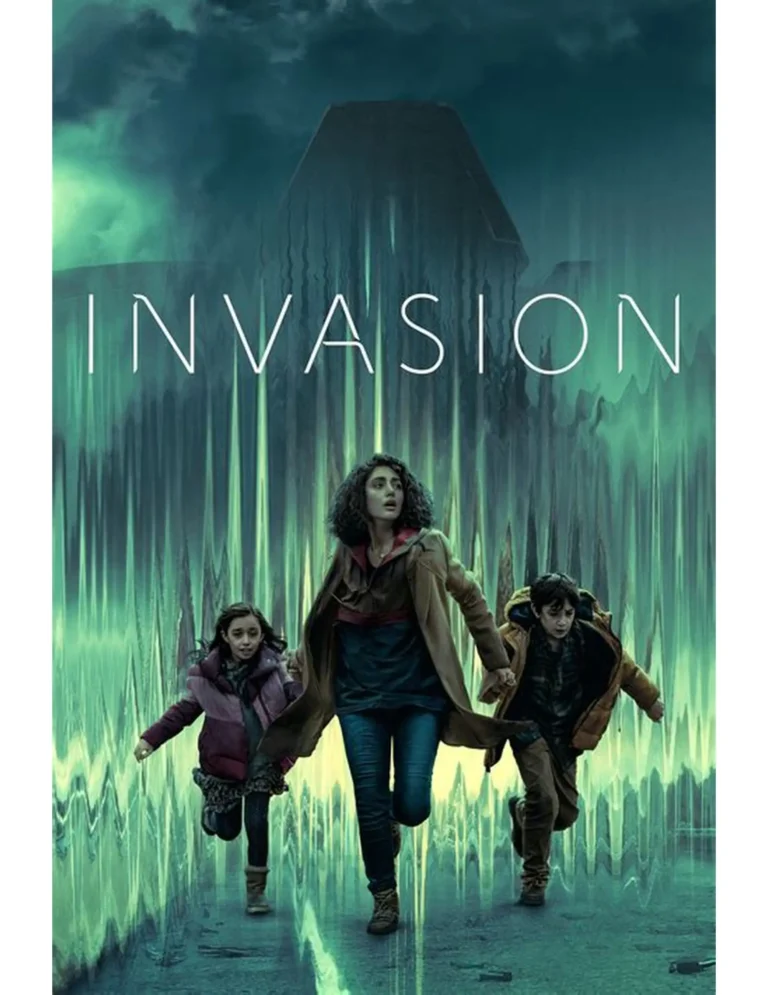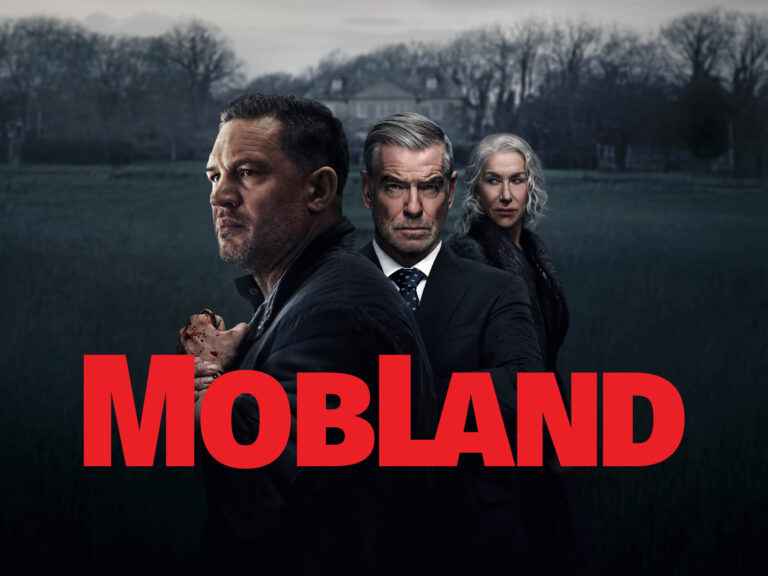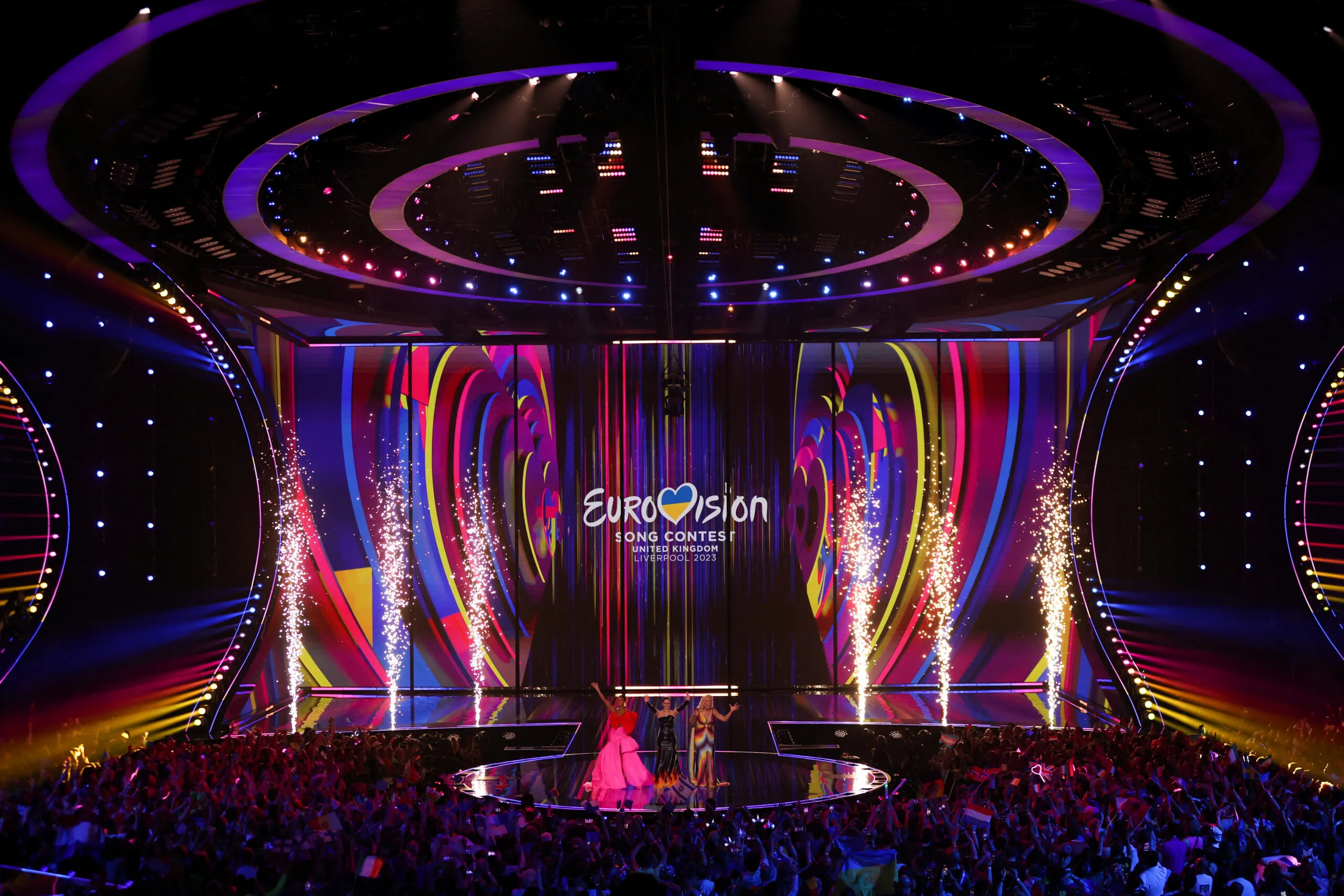
Eurovision Song Contest Basel 2025
Eurovision Song Contest Basel 2025 is one of the most highly anticipated international music events of the year, blending live music competition, television spectacle, and cross-border unity. Hosted in Basel, Switzerland, the 69th edition of the contest is presented by Hazel Brugger, Sandra Studer, and Michelle Hunziker. Organized by the European Broadcasting Union (EBU) and produced by SRG SSR, this pan-European TV mini-series runs as a high-profile event across three major broadcasts: two semi-finals and one grand final, all scheduled in May 2025.
Movie Overview[]
The Eurovision Song Contest 2025, also referred to as Eurovision Song Contest Basel 2025, is structured as a TV mini-series consisting of three main live-broadcast episodes: two semi-finals on 13 and 15 May, and the grand final on 17 May, all taking place at St. Jakobshalle in Basel :contentReference[oaicite:0]{index=0}.
The contest features 37 participating countries vying for a spot in the final, which includes 26 entries: 10 qualifiers from each semi-final plus the host country, Switzerland, and the “Big Five” automatically guaranteed places in the grand final :contentReference[oaicite:1]{index=1}. The show is produced by the Swiss Broadcasting Corporation (SRG SSR) in collaboration with the EBU, under the titles of executive producers Reto Peritz and Moritz Stadler :contentReference[oaicite:2]{index=2}.

Attribute Details[]
- Title [Eurovision Song Contest Basel 2025]
- Genre [Music Competition, Live Television, International Spectacle]
- Language [Primarily performed in English and other participating countries’ languages; presented in English, German (Basel region), and possibly French/Italian subtitles due to location and audiences]
- Release Date [Semi-final 1: 13 May 2025; Semi-final 2: 15 May 2025; Grand Final: 17 May 2025]
- Director(s) [Robin Hofwander, Fredrik Bäcklund, Myriam von Necker] :contentReference[oaicite:3]{index=3}
- Writer(s) [Live event—not scripted; however, executive supervision by Martin Österdahl and ESC Director Martin Green oversee program flow] :contentReference[oaicite:4]{index=4}
Event Details of Eurovision Song Contest Basel
The theme of Eurovision 2025 is “Welcome Home,” under the permanent Eurovision slogan “United by Music,” with the Swiss host broadcaster SRG SSR adopting the specific concept for this year’s event :contentReference[oaicite:5]{index=5}. Basel was chosen as the host city—its first time hosting Eurovision, and the first time the event is held in the German-speaking part of Switzerland since Lugano in 1956 and Lausanne in 1989 :contentReference[oaicite:6]{index=6}. The venue, St. Jakobshalle, offers seating for over 12,400 spectators and was selected for its excellent infrastructure and international accessibility :contentReference[oaicite:7]{index=7}.
Hosts & Production of Eurovision Song Contest Basel
The semi-finals are hosted by Hazel Brugger and Sandra Studer, with Michelle Hunziker joining for the grand final :contentReference[oaicite:8]{index=8}. Executive producers Reto Peritz and Moritz Stadler, along with directors Robin Hofwander, Fredrik Bäcklund, and Myriam von Necker, oversee the televised production. The EBU and SRG SSR ensured seamless coverage across Europe through advanced broadcast technology and staging :contentReference[oaicite:9]{index=9}.
Final Results & Winner of Eurovision Song Contest Basel
Austrian countertenor JJ, performing the song “Wasted Love,” won the Eurovision Song Contest 2025. This marks Austria’s third victory in the contest, following the wins of Udo Jürgens (1966) and Conchita Wurst (2014) :contentReference[oaicite:10]{index=10}. JJ received an enthusiastic reception upon returning to Austria, celebrated by fans, national leaders, and institutions including the Vienna State Opera :contentReference[oaicite:11]{index=11}.
Israel’s Yuval Raphael secured second place with “New Day Will Rise,” a performance marked by emotional resonance and amid political tensions surrounding the Gaza conflict :contentReference[oaicite:12]{index=12}. Estonia’s Tommy Cash finished third, and Germany’s act, Abor & Tynna with the song “Baller,” placed 15th with 151 points overall (77 jury + 74 televote) :contentReference[oaicite:13]{index=13}.
Switzerland’s Performance of Eurovision Song Contest Basel
As host country, Switzerland’s entry, “Voyage” performed by Zoë Më, was internally selected and automatically qualified for the grand final. Performing at 19th position, Switzerland finished 10th with 214 points :contentReference[oaicite:14]{index=14}.
Broadcast & Audience of Eurovision Song Contest Basel
The final attracted approximately 166 million viewers across 37 territories, a notable increase compared to previous years :contentReference[oaicite:15]{index=15}. The show’s “Made in Switzerland” interval act, performed during the first semi-final, was released as a single and reached #16 on the Swiss charts :contentReference[oaicite:16]{index=16}.
Political Context & Controversy of Eurovision Song Contest Basel
The contest took place amid growing protests and geopolitical tensions, especially regarding Israel’s participation in the event. Disruptions occurred during Yuval Raphael’s performance, including an attempted stage invasion—none of which interrupted the overall production. Broadcasters and organizations emphasized Eurovision’s political neutrality, while messages of peace and human rights were incorporated into the broadcast by various partners :contentReference[oaicite:17]{index=17}.
Economic & Cultural Impact of Eurovision Song Contest Basel
Basel’s hosting of Eurovision 2025 brought a projected economic boost estimated at around CHF 60 million, based on modeling from previous host years. The event bolstered tourism, local business activity, and global visibility for the city :contentReference[oaicite:18]{index=18}. The slogan “Crossing borders,” featured in Basel’s bid, underscored the city’s location at the crossroads of France, Germany, and Switzerland, and its international appeal :contentReference[oaicite:19]{index=19}.
Why It Matters
Eurovision Song Contest Basel 2025 is more than a music competition—it’s a celebration of cultural unity, media spectacle, and artistic performance on a massive scale. It blends high production values, modern broadcast innovation, and diverse musical expression. With a theme like “Welcome Home,” it resonated emotionally during a time when cross-border understanding and shared entertainment remain deeply valued. The event affirmed Eurovision’s continued relevance and its power to reach hundreds of millions around the globe.
Eurovision Song Contest Basel 2025
Eurovision Song Contest Basel 2025 is one of the most anticipated international music events of the year, blending live performance, television spectacle, and cultural unity. Hosted in Basel, Switzerland, this is the 69th edition of the contest, featuring dazzling stage productions, diverse performances, and global viewership.
Introduction to Eurovision 2025
The Eurovision Song Contest Basel 2025 is organized by the European Broadcasting Union (EBU) and hosted by SRG SSR. As Switzerland celebrates its hosting duties, the event will bring together artists from across Europe and beyond to compete on one of the world’s most prestigious music stages.
The Host City: Basel
Basel, a cultural hub located at the crossroads of Switzerland, Germany, and France, has been selected as the host city for Eurovision 2025. With its vibrant arts scene and world-class infrastructure, Basel provides a fitting backdrop for an event that emphasizes unity and diversity. The venue, St. Jakobshalle, accommodates over 12,400 spectators and will serve as the main stage for the contest.
Event Dates and Schedule of Eurovision Song Contest Basel
The contest is divided into three live broadcasts: Semi-final 1 on 13 May 2025, Semi-final 2 on 15 May 2025, and the Grand Final on 17 May 2025. Millions of viewers across the world will tune in to see which acts make it through the semi-finals and who ultimately claims the Eurovision trophy in the grand finale.
Theme and Slogan of Eurovision Song Contest Basel
The official theme for Eurovision 2025 is “Welcome Home”, paired with the long-standing slogan “United by Music”. The theme reflects Switzerland’s role as host and symbolizes inclusivity, belonging, and a shared sense of celebration for all participants.
The Production Team of Eurovision Song Contest Basel
Eurovision 2025 is directed by Robin Hofwander, Fredrik Bäcklund, and Myriam von Necker, ensuring cutting-edge broadcast quality and stage direction. Executive producers Reto Peritz and Moritz Stadler oversee the show’s creative and logistical elements, while Martin Österdahl, the Eurovision executive supervisor, guarantees adherence to Eurovision’s tradition and standards.
The Hosts of Eurovision 2025
The live shows are presented by Hazel Brugger and Sandra Studer for the semi-finals, while Michelle Hunziker joins them for the Grand Final. The choice of Swiss-born and internationally recognized presenters highlights Switzerland’s diverse cultural identity.
The Participants of Eurovision Song Contest Basel
A total of 37 countries are competing in the 2025 contest. As always, the “Big Five” (France, Germany, Italy, Spain, and the United Kingdom) and the host country, Switzerland, automatically qualify for the Grand Final. The remaining slots are decided through the two semi-final rounds.
The Winner: Austria’s JJ of Eurovision Song Contest Basel
The 2025 Eurovision crown was claimed by Austrian countertenor JJ with his song “Wasted Love”. This victory marks Austria’s third win in Eurovision history, following Udo Jürgens in 1966 and Conchita Wurst in 2014. JJ’s haunting performance captivated both the jury and public, securing him the top spot.
Runner-Up: Israel’s Yuval Raphael
Second place went to Yuval Raphael from Israel, with his powerful ballad “New Day Will Rise.” His performance struck an emotional chord with audiences, standing out amidst political tensions and large-scale protests surrounding Israel’s participation.
Estonia’s Strong Showing of Eurovision Song Contest Basel
Estonia’s Tommy Cash surprised audiences and critics alike by taking third place with his innovative and experimental performance. His act was one of the most talked-about of the contest, cementing Estonia’s growing reputation in the Eurovision landscape.
Switzerland’s Entry of Eurovision Song Contest Basel
As host, Switzerland was represented by Zoë Më with the song “Voyage.” Automatically qualified for the Grand Final, the entry earned Switzerland a respectable 10th place, with strong support from the jury and fans alike.
Germany’s Participation of Eurovision Song Contest Basel
Germany entered with the track “Baller” by Abor & Tynna. Despite high expectations, Germany placed 15th overall with 151 points. However, the entry received praise for its unique style and modern staging.
Audience and Global Reach of Eurovision Song Contest Basel
The Eurovision 2025 Grand Final attracted over 166 million viewers worldwide, maintaining Eurovision’s reputation as one of the most-watched non-sporting events on the planet. Social media engagement was also record-breaking, with hashtags like #Eurovision2025 and #WelcomeHome trending globally.
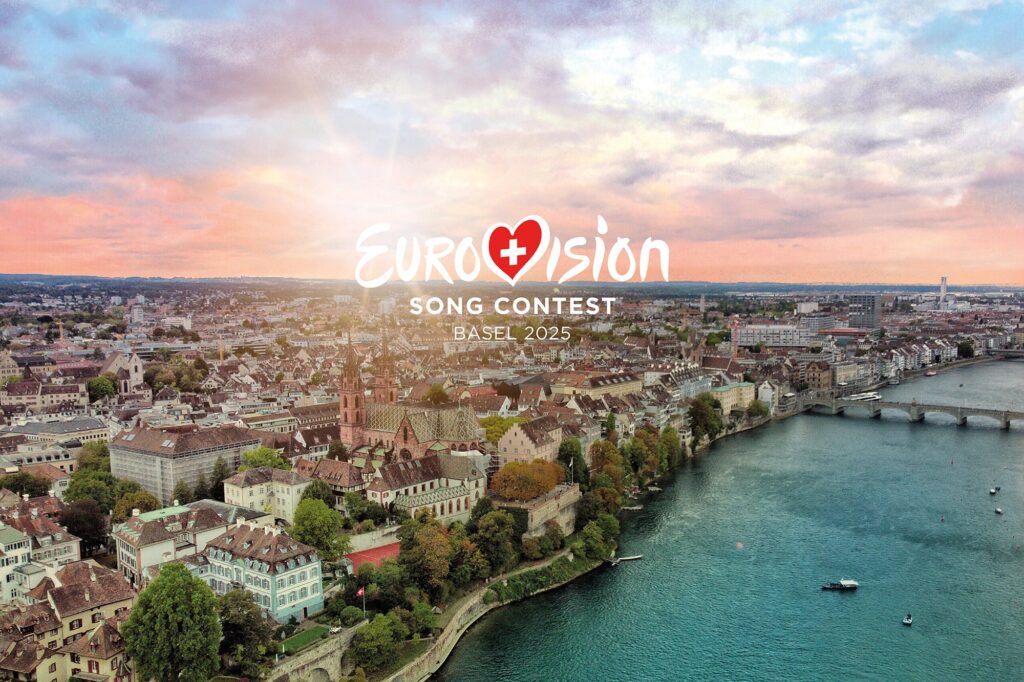
Interval Acts and Special Performances
The interval act, titled “Made in Switzerland”, celebrated Swiss culture and was released as a single, even reaching the Swiss music charts. Guest performers included past Eurovision legends, creating memorable moments for fans across Europe.
Political Context and Protests of Eurovision Song Contest Basel
Eurovision 2025 was not without controversy. Large protests took place around Basel concerning Israel’s participation due to ongoing conflicts in Gaza. Security was heightened, and a stage invasion attempt occurred during Israel’s performance but was swiftly handled without disrupting the broadcast.
Economic Impact of Hosting of Eurovision Song Contest Basel
Hosting Eurovision brought significant economic benefits to Basel, with an estimated CHF 60 million boost to local businesses, tourism, and infrastructure. Hotels, restaurants, and cultural sites saw record bookings during the event week.
Cultural Significance of Eurovision Song Contest Basel
Eurovision 2025 highlighted Europe’s cultural diversity and artistic creativity. The contest serves as a platform for artists to share music in their native languages, blending tradition with modern soundscapes, and fostering cross-cultural appreciation.
Why Eurovision 2025 Stands Out of Eurovision Song Contest Basel
What makes Eurovision 2025 special is not only the music but also the symbolism of unity. With the slogan “Welcome Home”, this year’s contest reminded audiences that Eurovision is more than a competition—it is a celebration of belonging, creativity, and peace through music.
The Evolution of Eurovision
Since its first edition in 1956, the Eurovision Song Contest has grown into a global entertainment phenomenon. What started with just seven countries has now expanded to nearly 40 participants each year. Eurovision 2025 in Basel reflects this legacy, showing how the event continues to evolve while staying true to its roots of musical diversity and cultural exchange.
Stage Design and Innovation
Each year, Eurovision impresses audiences with groundbreaking stage design, and 2025 was no exception. The stage at St. Jakobshalle featured a rotating LED floor, advanced pyrotechnics, and over 1,500 lighting units, making it one of the most technologically sophisticated stages in Eurovision history. This innovative design allowed each performance to feel unique and visually spectacular.
Fan Engagement and Social Media Buzz of Eurovision Song Contest Basel
Eurovision thrives on fan interaction, and 2025 saw record-breaking online activity. TikTok challenges, Instagram reels, and Twitter trends amplified the event’s visibility worldwide. Fan-voted polls and online discussions fueled excitement before and after each show, proving Eurovision’s role as both a television event and a digital experience.
Green Initiatives in Eurovision 2025 of Eurovision Song Contest Basel
Switzerland placed a strong emphasis on sustainability during Eurovision 2025. The contest introduced eco-friendly stage materials, reduced plastic use in venues, and encouraged fans to use public transport to access the events. These green initiatives reflected Switzerland’s commitment to environmental responsibility while setting a new standard for future Eurovision contests.
Fashion Highlights from the Contest
Fashion has always been an integral part of Eurovision, and the 2025 edition did not disappoint. From Austria’s JJ performing in a futuristic black-gold ensemble to Estonia’s Tommy Cash showcasing avant-garde streetwear, the contest became as much about visual storytelling as it was about music. Designers across Europe praised Eurovision for giving artists the freedom to experiment with bold fashion choices.
The Role of the Jury vs. Televote
The final results of Eurovision 2025 highlighted the balance between jury votes and public televoting. While Austria’s JJ earned high marks from both groups, Israel’s Yuval Raphael benefited more from televotes, demonstrating how audience support can significantly influence outcomes. This balance ensures that both professional music experts and everyday fans have a voice in selecting the winner.
Returning Artists and Eurovision Alumni
Several artists in Eurovision 2025 were familiar faces, having competed in previous editions or being alumni of national contests. Their return brought additional excitement, as fans followed their journeys and compared their growth since their last appearances. Eurovision continues to serve as a launching pad for long-term music careers.
The Importance of Language Diversity
Eurovision 2025 showcased a wide range of languages, from English and French to Hebrew, Estonian, and Albanian. This linguistic diversity reflects the contest’s mission of cultural unity and emphasizes that music transcends language barriers. Songs performed in native languages often stood out for their authenticity and emotional power.
Eurovision as a Tourism Magnet
The contest attracts tens of thousands of visitors each year, and Basel saw a surge of international tourists in May 2025. Beyond the live shows, fans explored museums, Swiss cuisine, and Rhine River tours. The city became a hub of cultural celebration, proving that Eurovision is as much about travel and tourism as it is about music.
Memorable Moments of 2025
Every Eurovision has unforgettable moments, and 2025 delivered several. Austria’s breathtaking final performance, Israel’s emotional crowd reaction, and Switzerland’s heartfelt “Welcome Home” staging all left lasting impressions. These iconic moments will be remembered by fans for years to come, solidifying Eurovision 2025’s place in contest history.
Behind the Scenes of Eurovision 2025
While the spotlight shines on the artists, hundreds of crew members, stage designers, and technical experts work tirelessly behind the scenes to make Eurovision possible. From rehearsals to live broadcasts, the event is a showcase of teamwork, coordination, and precision. Fans rarely see this backstage magic, but it is the backbone of Eurovision’s success.
Security Measures and Crowd Management
Given the political tensions and massive turnout, security was a top priority for Eurovision 2025. Swiss authorities deployed thousands of security personnel across Basel, ensuring the safety of fans, artists, and visitors. Despite minor incidents such as protest attempts, the event ran smoothly, highlighting Switzerland’s organizational efficiency.
Eurovision and Political Statements
Over the years, Eurovision has occasionally been a platform for political expression, and 2025 was no different. From lyrical interpretations to symbolic costumes, several acts subtly referenced global issues. However, the European Broadcasting Union maintained its rules of neutrality, reminding participants that Eurovision is primarily about music and unity.
The Voting Controversies
No Eurovision is complete without debates about the voting system. In 2025, some fans criticized the jury results for undervaluing certain performances. Online discussions questioned whether political alliances influenced voting patterns, though the EBU emphasized the fairness and transparency of the process. These controversies only added to the excitement and drama of the event.
Impact on European Pop Culture
Eurovision has shaped the European music landscape for decades, launching careers and introducing innovative sounds. The 2025 edition reinforced its role as a cultural influencer, with winning songs like Austria’s “Wasted Love” topping streaming charts across multiple countries. Eurovision acts often cross into mainstream radio, solidifying the contest’s impact on pop culture.
Broadcast and Streaming Reach
The Eurovision 2025 broadcast reached over 166 million viewers worldwide, but what’s remarkable is its digital presence. Streaming platforms such as YouTube and official Eurovision apps made performances instantly available for global fans. This dual model of traditional TV and online streaming ensures Eurovision remains accessible to younger audiences worldwide.
Eurovision’s Contribution to Diversity
Eurovision has always celebrated diversity, not only in music styles but also in gender identity, culture, and expression. The 2025 edition continued this tradition, with performances ranging from traditional folk influences to futuristic electronic sounds. Representation of LGBTQ+ artists and gender-fluid performers further emphasized Eurovision’s reputation as a space for inclusivity.
Economic Benefits for Switzerland
Hosting Eurovision gave Basel and Switzerland a major economic boost. Hotels, restaurants, and tourism services saw record bookings, while local businesses benefited from the influx of visitors. Economists estimated that Eurovision 2025 generated over CHF 60 million in revenue, proving that the contest is not just a cultural event but also a powerful economic engine.
Rehearsals and Preparation
Before the live shows, each act undergoes multiple rehearsals to perfect sound quality, choreography, and lighting. These rehearsals are crucial in ensuring flawless performances, and they also give fans a sneak peek through press events. By the time the live semi-finals and finals arrive, each act has already performed on stage several times.
Fan Culture and Euroclubs
Eurovision has a passionate fan base, and Basel hosted several Euroclubs where fans gathered to celebrate, sing, and dance to Eurovision classics. These fan events are almost as important as the main contest, offering fans a chance to meet fellow enthusiasts and immerse themselves in Eurovision culture outside of the arena.
Technology and Visual Effects
The use of augmented reality, drone shots, and advanced lighting effects made Eurovision 2025 one of the most visually dynamic editions to date. Each country’s delegation worked with Swiss production teams to customize visuals, ensuring their songs stood out both on stage and on screen. This innovation keeps Eurovision ahead as a modern entertainment giant.
The Cultural Exchange Among Artists
Beyond the competition, Eurovision fosters cultural exchange between artists from different countries. Performers often share traditions, collaborate musically, and celebrate one another’s successes. In 2025, the green room backstage became a symbol of unity, where artists cheered for one another regardless of nationality or placement.
The Future of Eurovision
Eurovision 2025 in Basel sets a high bar for future contests. With its blend of tradition, innovation, and inclusivity, it demonstrated how Eurovision continues to evolve with the times. Fans are already speculating about the host city for 2026, eager to see how the next chapter of this cultural phenomenon will unfold.
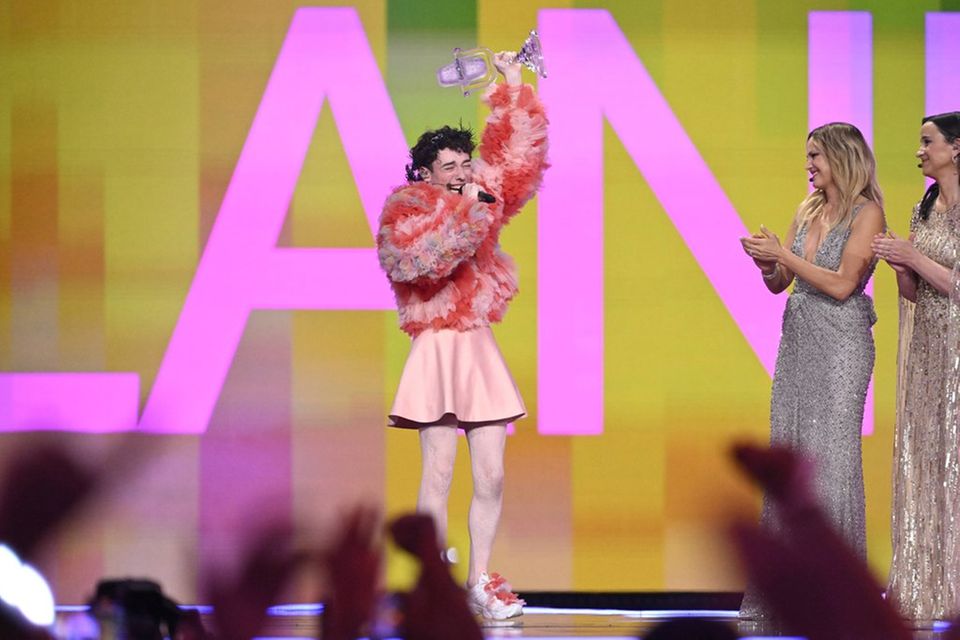
Eurovision Song Contest Basel 2025 – FAQs
What is Eurovision Song Contest Basel 2025?
The Eurovision Song Contest Basel 2025 is the 69th edition of the annual international music competition. It took place in Basel, Switzerland, following Switzerland’s win in 2024. The contest brought together over 35 participating countries, showcasing diverse music styles, cultures, and performances.
When did Eurovision 2025 take place?
Eurovision 2025 was held in May 2025. The semi-finals took place on May 13 and May 15, while the grand final was held on May 17 at the St. Jakobshalle arena in Basel, Switzerland.
Where was Eurovision 2025 hosted?
The contest was hosted in Basel, Switzerland, at the St. Jakobshalle arena. Basel was chosen for its modern infrastructure, cultural significance, and ability to host thousands of fans and international delegations.
Who won Eurovision 2025?
Austria’s artist JJ won Eurovision 2025 with the song “Wasted Love.” His powerful performance and emotional lyrics resonated with both juries and audiences, earning him the top spot.
Which countries participated in Eurovision 2025?
A total of 37 countries participated in Eurovision 2025, including nations from across Europe and guest entries like Australia. Each country submitted one original song performed live during the contest.
How many people watched Eurovision 2025?
The contest attracted over 166 million viewers worldwide, making it one of the most-watched non-sporting events on the planet. The digital audience also grew, with millions engaging on YouTube and social media platforms.
What was special about the Eurovision 2025 stage?
The stage design in Basel was among the most innovative in Eurovision history. It featured rotating LED floors, giant screens, and state-of-the-art lighting technology, creating unique settings for each performance.
How is the winner of Eurovision decided?
The winner of Eurovision is determined through a combination of jury votes and public televotes. Each participating country provides points based on these two systems, and the country with the highest combined score wins.
Did Switzerland perform in Eurovision 2025?
Yes, Switzerland performed as the host country in Eurovision 2025. Their entry was a heartfelt song titled “Welcome Home,” which received strong support from both local and international fans.
How do artists get selected for Eurovision?
Each participating country chooses its representative either through a national selection competition or by internal selection from their national broadcaster. These processes often involve a mix of jury panels and fan voting.
What languages were used in Eurovision 2025 songs?
Eurovision 2025 featured songs in multiple languages, including English, French, Hebrew, Albanian, and Estonian. This multilingual diversity highlights the contest’s cultural richness and inclusivity.
Were there any controversies in Eurovision 2025?
As with most Eurovision editions, some debates arose regarding the jury votes versus televotes. Fans discussed whether political alliances influenced voting, but the European Broadcasting Union maintained transparency in the process.
What role did social media play in Eurovision 2025?
Social media played a crucial role in Eurovision 2025. Platforms like TikTok and Twitter exploded with fan content, reactions, and memes, while official Eurovision channels provided exclusive backstage clips and interviews.
Was Eurovision 2025 environmentally friendly?
Yes, the event emphasized sustainability. The production team minimized plastic use, encouraged public transport, and implemented eco-friendly materials in stage design. Basel’s hosting became a model for greener Eurovision contests.
What impact does Eurovision have on the host city?
Hosting Eurovision significantly boosts tourism and the local economy. Basel welcomed thousands of visitors, filling hotels, restaurants, and cultural venues. The contest generated millions in revenue for Switzerland in 2025.
Can non-European countries join Eurovision?
Yes, Eurovision allows participation from countries outside Europe. For example, Australia has been a regular participant since 2015. Eurovision is organized by the European Broadcasting Union, and membership defines eligibility.
What genres of music were popular in Eurovision 2025?
Eurovision 2025 showcased a variety of genres, including pop, rock, electronic, ballads, and folk-inspired tracks. This diversity ensures that audiences experience a wide range of musical expressions.
Who hosted Eurovision 2025?
The contest was hosted by a team of charismatic presenters from Switzerland, chosen for their international appeal and language skills. They guided the audience through the semi-finals and the grand final with humor and professionalism.
What are Euroclubs, and did Basel have them in 2025?
Euroclubs are fan-centered events where Eurovision enthusiasts gather to celebrate, dance, and enjoy past contest hits. Basel hosted multiple Euroclubs during Eurovision week in 2025, adding to the festive atmosphere.
What’s next after Eurovision 2025?
After the conclusion of Eurovision 2025 in Basel, fans began speculating about the 2026 host city. Traditionally, the winning country hosts the next edition, meaning Austria is expected to host Eurovision 2026.

